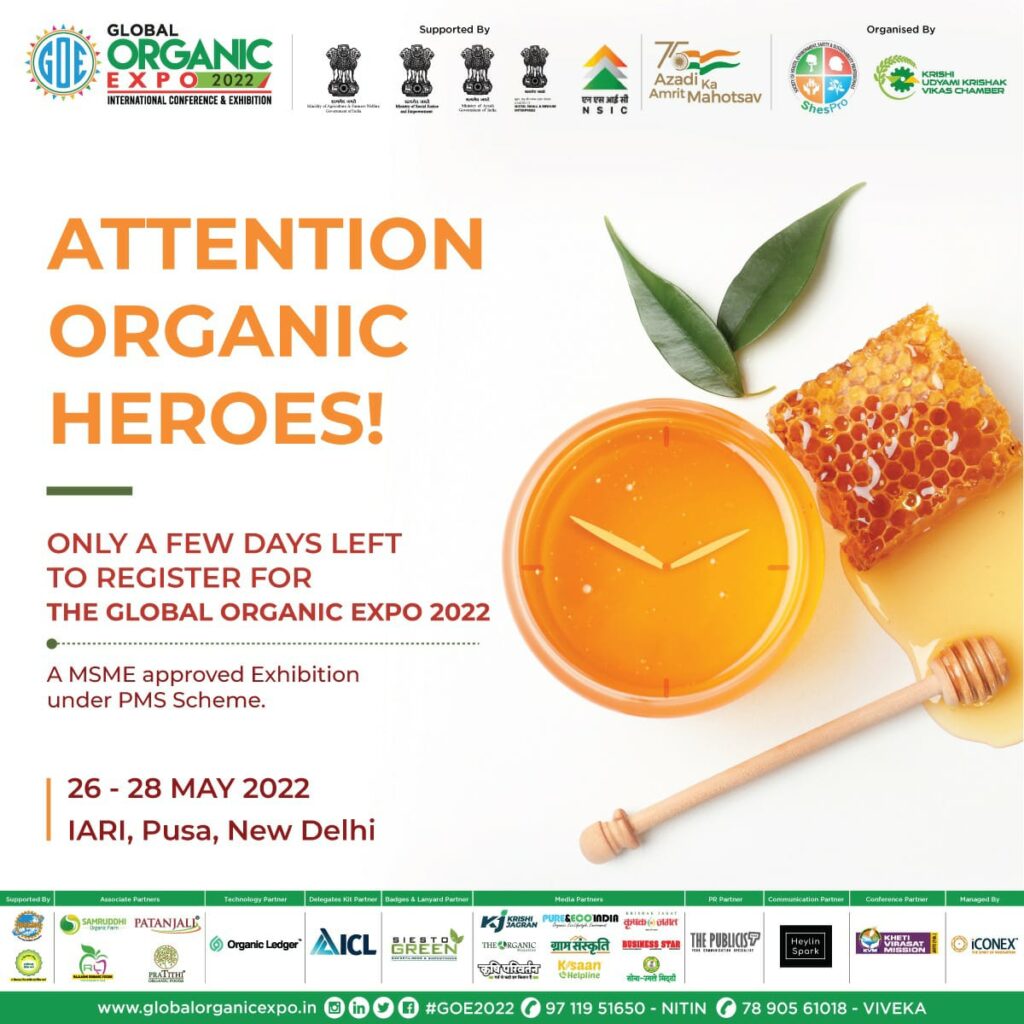The 3rd Global Organic Expo is being organised by Society of Health, Environment, Safety and Sustainability Professionals (SHESPro), New Delhi from 26 to 28 May 2022 at Indian Agricultural Research Institute (IARI), Pusa, New Delhi.
The Society of Health, Environment, Safety and Sustainability Professionals {SHESPro} is a non-profit organization that promotes health, environmental, safety and sustainability initiatives globally.
“Global Organic Expo 2022” is an International Conference & Exhibition on the organic sector which includes food farming, Innovations, Technology, and Skill Development, Start-ups in Organics, Marketing Distribution and Exports.
On 3rd August 2021,a curtain raiser was organized in New Delhi under the leadership of Honourable Minister of State – Social Justice & Empowerment, Shri Ramdas Athawale. The brochure was inaugurated by Honourable Shri Narendra Singh Tomar ji, Minister of Agriculture & Farmers Welfare. Shri JP Mishra Ji, OSD at Indian Council of Agricultural Research (ICAR) will be the Convenor for Global Organic Expo 2022 with vast experience of agricultural research, development and programme implementation and an Expert in programme formulation, execution and monitoring and their evaluation.
The objective of this 3 day event is to promote India’s ancient farming system with the latest technologies and scientific methods to ensure production, marketing and income enhancement of high quality products by the farmers.
Dedicated to the nation sage, Bharat Ratna revered Nanaji Deshmukh about 1 lakh farmers, more than 600 companies, from more than 10 countries are expected to participate in this event. In addition to the exhibition at the Global Organic Expo, more than 20 conference sessions will be conducted by distinguished scientists/organic agriculture experts and progressive farmers working in organic agriculture. Participation of almost every state of the country, participation of farmers, research centres and agricultural educational universities is to be ensured in the exhibition.
The program will be inaugurated by Shri Narendra Singh Tomar, Hon’ble Minister of Agriculture and Farmers Welfare, Government of India. of India.
Focused Area –
Natural Farming -Natural Farming is a chemical-free alias traditional farming method. It is considered as agro ecology based diversified farming system which integrates crops, trees and livestock with functional biodiversity. In India, Natural farming is promoted as Bharatiya Prakritik Krishi Paddhati Programme (BPKP) under centrally sponsored scheme- Paramparagat Krishi Vikas Yojana (PKVY). BPKP is aimed at promoting traditional indigenous practices which reduces externally purchased inputs. It is largely based on on-farm biomass recycling with major stress on biomass mulching, use of on-farm cow dung-urine formulations; periodic soil aeration and exclusion of all synthetic chemical inputs. According to HLPE Report, natural farming will reduce dependency on purchased inputs and will help to ease smallholder farmers from credits burden. The BPKP programme has been adopted in State of Andhra Pradesh, Karnataka, Himachal Pradesh, Gujarat, Uttar Pradesh and Kerala. Several studies have reported the effectiveness of natural farming- BPKP in terms of increase in production, sustainability, saving of water use, improvement in soil health and farmland ecosystem. It is considered as a cost- effective farming practices with scope for raising employment and rural development. NITI Aayog along with Ministry of Agriculture & Farmers welfare had convened several high level discussions with global experts on Natural farming practices. It is roughly estimated that around 2.5 million farmers in India are already practicing regenerative agriculture. In the next 5 years, it is expected to reach 20 lakh hectares- in any form of organic farming, including natural farming, of which 12 lakh hectares are under BPKP.
Biofertilizer – Due to the rising cost of chemically fixed nitrogen fertilizers used and the massive inputs for manufacturing it, have made the urgency to find other option for the same. We have many helpful microorganisms which are already present in most of the agricultural soil, which help in supplying the nutrients in the natural way. We just need to understand the role of them specifically and just increase their inoculation (population). These microbes also help in reducing the harmful pathogens present in the agricultural soil which in turn reduces the plant diseases resulting in the less need of harmful pesticides and also make available the nutrients in simple form so that plants can easily absorb them from the soil for their healthy growth.
Food Processing – A strong and dynamic food processing sector plays a vital role in reducing wastage of perishable agricultural produce, increasing shelf life of food products, value addition of agricultural products, diversification and commercialization of agriculture, employment generation, increasing farmers’ income. Creating a surplus for the export of agricultural and processed foods. In the era of economic liberalization including all sections; The private, public and cooperative sectors have played a defined role and the Ministry promotes their active participation.
Agro Tourism – Agro Tourism is the booming sector now as India has emerged as a champion of natural foods during the COVID-19 and the whole world wants to go back to nature, villages and spending times. The trend is now to increasing immunity and health has become the first priority. There is immense potential for agro tourism in India in terms of area. Being an agricultural country and huge lands of farming, we can also attract foreign tourists in abundance.
Organic Husbandry – Good animal health and welfare is an important goal for organic husbandry. In contrast to crops, animals are not just part of the farming system; they are also sentient creatures and as such deserve special care and moral consideration. Animal management is therefore different from crop management in that humans have a moral obligation to treat animals well and to intervene before they suffer or die, as this is unacceptable. Organic livestock production and animal welfare go hand in hand so, with the rising importance of animal welfare, organic animal production may also get a boost in coming years. Global Organic Expo 2022 will be the huge platform to showcase these benefits to our farmers and consumers.
Biofuel – The Sustainable Alternative Towards Affordable Transportation (SATAT) scheme launched in October 2018 aims to establish an ecosystem for production of compressed biogas (CBG) from various waste biomass sources in the country. Under SATAT, 5000 CBG plants with a total production capacity of 15 million metric tonne per annum (MMTPA), which is equivalent to 54 MMSCMD of gas by 2023, has been planned. This initiative offers a potential for investment of about ₹1.75 lakh crore, generating about 75,000 direct employment opportunities. Many of the proposed plants will use crop residue such as paddy straw and biomass as feedstock for production of CBG, especially in Haryana, Punjab and Uttar Pradesh. The SATAT scheme will not only stanch greenhouse gas emissions, but will reduce burning of agricultural residue, which results in significant air pollution in cities like Delhi, generate employment in rural and waste management sectors, and boost income for farmers from their unutilised organic waste. One of the byproducts of CBG plants is biomanure, which can be used in farming. The 3rd Global Organic Expo 2022 is poised to become a premier platform for organic growers, aggregators, processors, value chain integrators and industry partners to offer global scale conferences and exhibitions with an appropriate theme “Profitability for Humanity”.
Website: www.globalorganics.in











More Stories
American Airlines to Offer Free Wi-Fi on Most Flights Starting 2026
UK Economy Grows Faster Than Expected in February Amid US Tariff Concerns
KFC Moves Headquarters from Kentucky to Texas